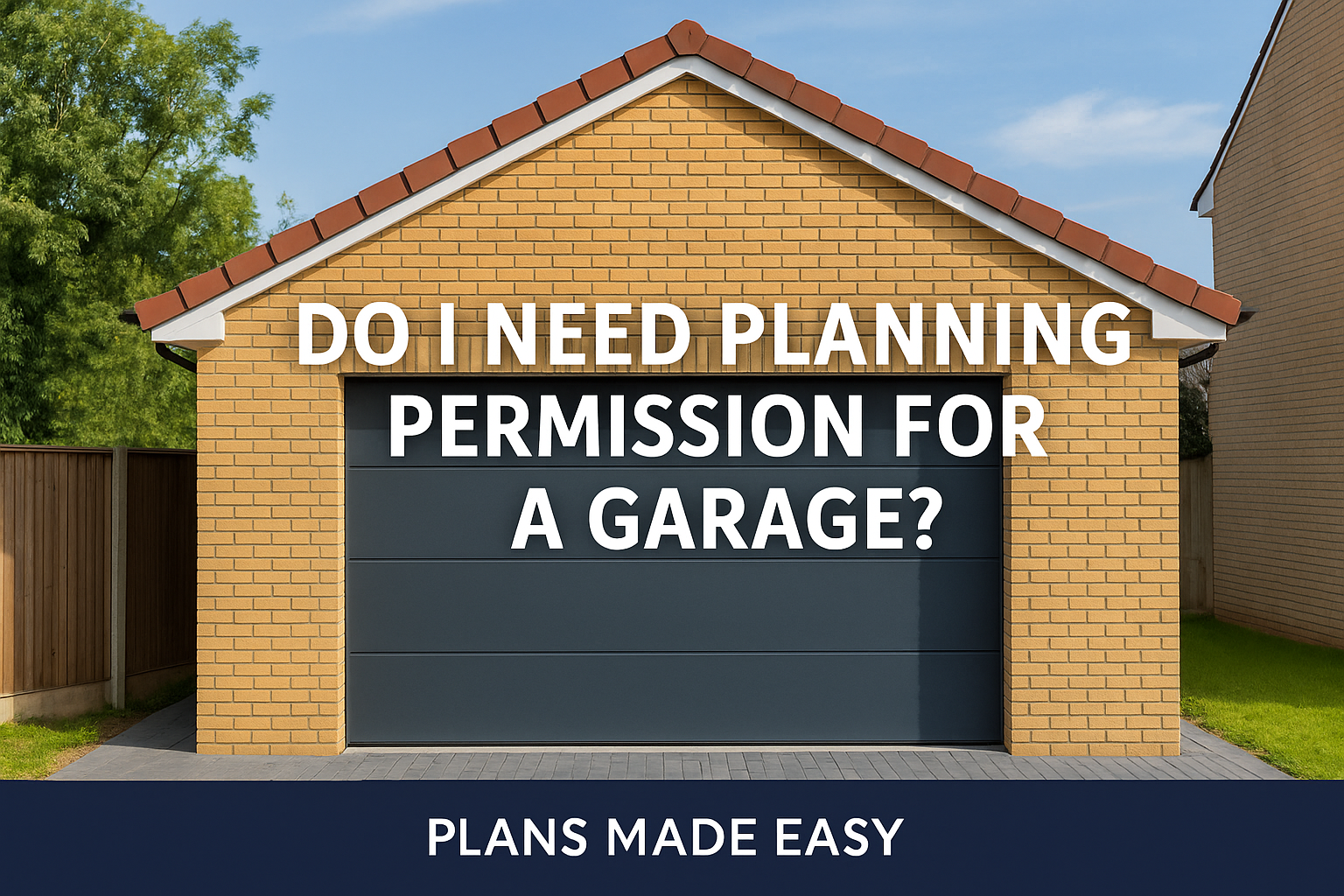Share this post:
Need planning advice fast?
Get clear answers on extensions, drawings, and permissions without the stress.
Quick Answer: In many cases, you don’t need planning permission for a garage if it falls under Permitted Development rules. However, factors such as size, height, location, and use of the garage can trigger the need for full planning permission. This guide explains the key rules so you can build with confidence.
Introduction
Garages remain one of the most popular home improvements in the UK. Whether you’re building a new detached garage, attaching one to your property, or converting an existing structure, the same question always comes up: “Do I need planning permission for a garage?”The answer depends on the design, size, and location of your garage. In many cases, you can proceed under Permitted Development (PD) rights — but not always. In this article, we’ll break down the rules, highlight common pitfalls, and guide you to the right solution for your project.When Do You Need Planning Permission for a Garage?
Planning permission is required if your proposed garage does not fall within the rules of Permitted Development. You’ll usually need full planning if:- The garage is higher than 4 metres at the ridge (for a dual-pitched roof) or 3 metres for other roof types.
- The eaves height exceeds 2.5 metres if the garage is within 2 metres of a boundary.
- The garage is forward of the principal elevation of your house (i.e. facing the road). Similar to extensions, forward-facing development almost always requires full approval.
- The total area of ground covered by outbuildings (including sheds and extensions) exceeds 50% of the land around the “original house.”
- You live in a conservation area, listed building, national park, or other protected zone.
Important: “Original house” means the property as it stood on 1 July 1948 (or when it was first built if later), not as it exists today after extensions. For a wider overview see Do I Need Planning Permission?
Garage Projects Under Permitted Development
Most homeowners benefit from PD rights, which allow certain types of development without a full planning application. A garage may be allowed under PD if it:- Is single-storey and does not exceed the maximum height limits.
- Is built to the side or rear of the property, not forward of the main façade.
- Does not cover more than half of the land around the house.
- Uses materials similar in appearance to the existing house.
- Is for domestic use only (not commercial or residential accommodation).
Tip: Even if planning permission is not required, you may still need Building Regulations approval for structural safety, insulation, and fire compliance.
Key Restrictions and Exceptions
Some circumstances automatically restrict or remove Permitted Development rights:- Conservation Areas & Listed Buildings: Garages almost always require full permission.
- Article 4 Directions: Local authorities can remove PD rights in certain areas.
- New Builds: Developers often remove PD rights as part of planning conditions.
- Shared Driveways or Access: May require neighbour consultation and formal consent.
Warning: Starting work without the correct permission can lead to enforcement notices and costly remedial action. For drawings and compliance help, see our guide on Planning Permission Drawings.
Garage Conversions vs. New Builds
Converting a garage into living space often requires different permissions than building a new garage:- Integral garage conversion: Usually does not require planning, but always needs Building Regulations.
- Detached garage conversion: May need planning if it changes the external appearance or use class.
- Bedroom, office, or rental unit conversions: More likely to trigger planning due to “change of use.”
Note: A garage converted into habitable space may also affect parking standards required by your council. For specific guidance on adding living space, see Do I Need Planning Permission for a Kitchen Extension?
Design Factors and Building Regulations
Even when planning permission is not required, other approvals may still apply:- Building Regulations: Cover structure, insulation, ventilation, fire safety, and drainage.
- Party Wall Act: May apply if the garage is built close to a neighbour’s wall or boundary.
- Highways Access: New vehicle crossovers (dropped kerbs) require separate approval from the council.
Tip: Always check with your local planning authority if you are unsure — many councils offer pre-application advice services. For a full breakdown of costs and approvals, see our guide Making Plans — Costs, Drawings & Approval.
Not sure if your idea fits Permitted Development?
We’ll check your project against PD rules and let you know if you need a full planning application.
Conclusion
So, do you need planning permission for a garage? The answer depends on size, height, position, and use. Many garages can be built under Permitted Development, but restrictions apply — especially in sensitive areas or where previous extensions already cover much of the plot.If you’re in doubt, seek professional advice. Getting it right at the start saves time, money, and stress later. At Plans Made Easy, we help homeowners navigate the rules, prepare compliant plans, and secure approvals smoothly.FAQs
Do I need planning permission for a garage attached to my house?
If the garage is attached and forward-facing, you’ll almost always need planning permission. Side or rear garages may fall under PD if they meet the size rules.What size garage can I build without planning permission?
Under PD, garages can usually be up to 4m high with a pitched roof, or 3m with a flat roof. Eaves must be under 2.5m if close to a boundary.Can I convert my garage into a bedroom without planning permission?
Integral garages often don’t need planning permission, but detached conversions or those creating new living accommodation usually require it.Do I need planning permission for a double garage?
A double garage is fine under PD if it stays within the height and area limits. Larger footprints or forward-facing builds generally require planning.Where can I check the rules for my area?
The best sources are the Planning Portal and your local council website. You can also read our guides such as Do I Need Planning Permission for an Extension?Ready to move your project forward?
Plans Made Easy can prepare compliant plans, manage submissions, and guide you from idea to approval.

Performance Verified ✅
This page meets PME Optimisation Standards — achieving 95+ Desktop and 85+ Mobile PageSpeed benchmarks. Verified on


